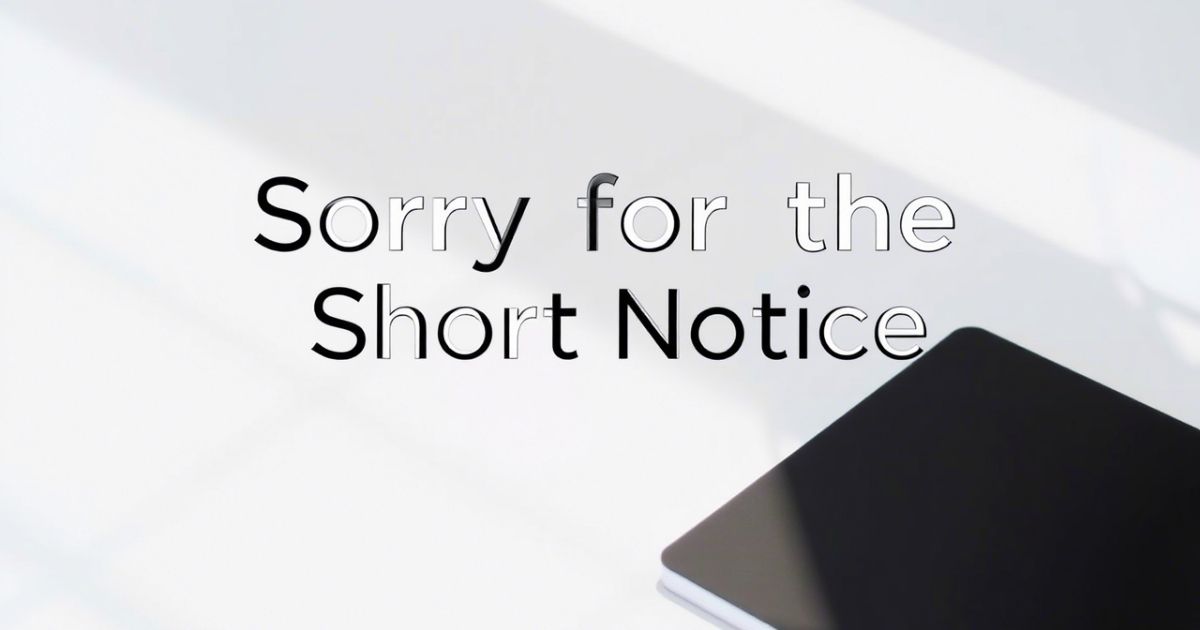Sorry for the Short Notice can be hard to say, but sometimes things happen fast. Whether it’s a change in plans, a canceled meeting, or a sudden request, saying sorry for the short notice shows you care. Life moves quickly, and we all get caught in moments where we have to apologize for the short notice. If you’ve ever said sorry for the last minute notice, you’re not alone. Everyone has had to make quick decisions, and a polite sorry for short notice can make a big difference.
We use apologies for the short notice when we let someone know about something at the last second. It’s polite to say sorry for the late notice and show understanding. Being honest and kind helps smooth things over. Saying sorry for the short notice clearly and kindly shows respect for someone’s time. So when in doubt, keep it simple and say sorry for short notice.
Main Points
- “Sorry for the short notice” is a standard way to acknowledge last minute communication.
- Alternatives can soften the impact of your late request or change.
- “I appreciate your understanding” conveys gratitude for their patience.
- “Thank you for your flexibility” acknowledges their ability to adapt.
- “I hope this isn’t too inconvenient” shows empathy for the disruption.
- “I regret the last-minute change” adds formality and responsibility to your apology.
- “I apologize for the rush” expresses regret for creating urgency.
- “I appreciate your patience” reinforces gratitude for their calm acceptance.
- “I didn’t mean to alarm you” helps ease any stress caused by sudden news.
- “I understand this is short notice” shows awareness of the inconvenience.
- “I’m sorry for the sudden update” emphasizes the unexpected nature of the change.
- “I hope you can accommodate” requests flexibility in handling the situation.
- “I appreciate your quick response” acknowledges their prompt action in a time crunch.
- “My apologies for the delay” directly addresses the tardiness of your communication.
- “I hope this works for you” expresses a considerate wish for smooth accommodation of changes.
I Appreciate Your Understanding
A gentle way to follow up a short-notice message is with appreciation. Saying “I appreciate your understanding” shows empathy and gratitude, making the situation more palatable for the recipient.
For example, after writing “sorry for the short notice,” you can add, “I appreciate your understanding during this unexpected change.” This shifts the tone from strictly apologetic to genuinely thankful.
Whether you say “sorry for short notice” or “apologies for the short notice,” expressing appreciation reassures the other person that you value their time and patience.
Thank You for Your Flexibility

Sometimes, it’s not just about saying “sorry for the late notice,” but also recognizing the effort someone makes to adapt. That’s where “thank you for your flexibility” comes in.
This phrase works well with or without the initial “sorry for the short notice”. It highlights the other person’s willingness to adjust, which can ease tension and foster goodwill.
Use it in combination with phrases like “apologize for the short notice” or “sorry for the last minute notice” to show both regret and appreciation.
I Hope This Isn’t Too Inconvenient
Apologies are stronger when you also consider the impact on the other person. Saying “I hope this isn’t too inconvenient” after “sorry for the short notice” conveys empathy and sincerity.
It’s a way of showing that you’re aware of potential disruptions caused by the late communication. Even if it’s unavoidable, it matters that you acknowledge the inconvenience.
Pairing this with “sorry for the late notice” or “apologies for the short notice” makes your message feel more respectful and thoughtful.
I Regret the Last-Minute Change
If you’re looking for a slightly more formal tone, especially in business settings, try “I regret the last-minute change.” It pairs naturally with “apologies for the short notice” or “sorry for the short notice.”
This phrase adds weight to your message, showing that you take the disruption seriously. It’s especially useful when dealing with clients, teams, or higher-ups.
Whether you say “sorry for the last minute notice” or “sorry for short notice,” following it with a phrase like this elevates your professionalism.
I Apologize for the Rush
When you’re not just notifying but requesting urgent action, “I apologize for the rush” is a strong phrase to use. It works well with “sorry for the short notice” to show you’re aware of the pressure it creates.
This is a great addition when someone has to respond quickly or rearrange their plans. It balances urgency with courtesy.
Use it alongside “apologize for the short notice” or “sorry for the late notice” to reinforce the tone of accountability.
Find More Words!
Looking to expand your vocabulary beyond “sorry for the short notice”? There are plenty of thoughtful phrases to convey similar meanings, depending on your tone and situation.
Try expressions like “thanks for bearing with me,” “sorry for springing this on you,” or “thanks for your patience.” They can replace or complement “sorry for the late notice” or “sorry for the last minute notice.”
Remember, whether you say “sorry for short notice” or “apologize for the short notice,” being sincere, clear, and kind will always come through.
Related Guide:
Discover 11 Other Ways to Say “Asset to Your Company”
I Appreciate Your Patience
When you have to make an unexpected change or request something at the last minute, acknowledging the patience of the recipient can soften the impact. Saying “I appreciate your patience” conveys gratitude for their understanding during a time of inconvenience.
This phrase works well after expressing “sorry for the short notice” or “sorry for the late notice,” adding a tone of warmth and respect. It lets the recipient know that you recognize their time is valuable.
For example, a simple “I apologize for the short notice, and I really appreciate your patience” can make all the difference in maintaining positive communication.
I Didn’t Mean to Alarm You
Sometimes, urgent or sudden changes may inadvertently cause stress. In these cases, using “I didn’t mean to alarm you” can show empathy and help calm any concerns after you’ve expressed “sorry for the last-minute notice.”
This phrase helps to ease the tension, especially when the situation is time-sensitive or unexpected. It reassures the recipient that the change, while sudden, doesn’t carry an urgent or alarming nature.
Pairing this with “apologize for the short notice” or “sorry for short notice” allows for a more considerate and understanding tone.
I Understand This Is Short Notice

An excellent way to acknowledge the timing of your message is by saying, “I understand this is short notice.” It shows awareness of the impact your late notice may have and demonstrates your sensitivity toward the situation.
Follow this up with phrases like “sorry for the late notice” or “apologies for the short notice,” and you’ll communicate that you fully grasp the inconvenience, making your apology feel more sincere.
This works well in both formal and informal settings and can help create a more understanding dialogue.
I’m Sorry for the Sudden Update
When a change comes unexpectedly, “I’m sorry for the sudden update” is an excellent alternative to “sorry for the short notice.” It emphasizes the sudden nature of the change while softening the impact of the message.
This phrase is ideal when the update is out of your control and is likely to cause disruption. It’s thoughtful and shows that you regret the surprise or inconvenience.
Using “sorry for the last-minute notice” or “sorry for the late notice” in combination can help ensure that your apology feels balanced and respectful.
I Hope You Can Accommodate
If you’re requesting someone’s flexibility in light of a sudden change, “I hope you can accommodate” is an ideal phrase. It acknowledges that the recipient might need to make an effort, making it sound more polite and considerate.
You could say, “Sorry for the short notice, I hope you can accommodate this change,” which highlights your understanding of the situation.
This phrase works particularly well in professional settings, especially when you need quick adjustments or responses.
I Appreciate Your Quick Response
In time-sensitive situations, “I appreciate your quick response” is a great follow up to any “sorry for the short notice” or “sorry for the late notice” message. It reinforces your gratitude for the recipient’s swift action and understanding.
Saying “I apologize for the short notice, and I appreciate your quick response” is a thoughtful way to close a last-minute request, acknowledging both the urgency and their cooperation.
This phrase is useful when you need a fast reply but still want to express gratitude.
My Apologies for the Delay

If a delay has caused inconvenience or if your communication is late, “my apologies for the delay” is a perfect phrase to use. It directly addresses the impact of your late action.
Pairing “sorry for the short notice” with “my apologies for the delay” can make your message sound more comprehensive and aware of the situation.
It’s a considerate phrase that makes clear you understand the ripple effect of your tardy communication.
I Hope This Works for You
Lastly, “I hope this works for you” is a great phrase to use when you’ve made a request or suggested a change. It expresses a sense of flexibility and consideration for the other person’s needs.
By combining this with “sorry for the last-minute notice” or “apologies for the short notice”, you convey that you value the recipient’s time and are hopeful they’ll be able to adjust accordingly.
This phrase shows you respect their time and hope that the change won’t cause undue stress.
FAQ’s
What are some polite alternatives to Sorry for the Short Notice?
You can say “Apologies for the short notice” or “Sorry for the last-minute notice” to soften the message. These alternatives sound friendly and respectful.
How can I apologize for late notice in a professional way?
Try saying “Sorry for the late notice” in emails or meetings. It shows you acknowledge the delay while keeping things professional.
What’s a casual way to say Sorry for the Short Notice?
“Sorry for the quick heads-up” or “Apologies for the rush” are casual alternatives. These work well in informal settings when you need to apologize quickly.
Can I use Sorry for the Last Minute Notice in formal situations?
Yes, “Sorry for the last-minute notice” works well in both formal and informal contexts. It’s polite and acknowledges that you’re addressing a time crunch.
How do I show understanding when apologizing for short notice?
To show understanding, say “I know this is last minute, sorry for the short notice.” This conveys empathy while apologizing for the timing.
Conclusion
Using Sorry for the Short Notice is a kind and respectful way to handle last minute changes. Whether you say sorry for the last minute notice or sorry for the late notice, it helps keep things clear and polite. Everyone understands that life can be unpredictable. That’s why we apologize for the short notice when plans change quickly. A thoughtful sorry for short notice can go a long way in keeping good relationships.
Always remember, saying Sorry for the Short Notice shows that you value someone’s time. Simple words like apologies for the short notice or sorry for the last minute notice let others know you care. Even if you must apologize for the short notice, your honesty matters. Saying sorry for short notice isn’t just polite, it’s thoughtful. So next time plans shift quickly, just say Sorry for the Short Notice with care and understanding.

Ember Rose is a dedicated administrator with 4 years of experience in efficient operations management and team leadership. Skilled in streamlining workflows and enhancing productivity.

